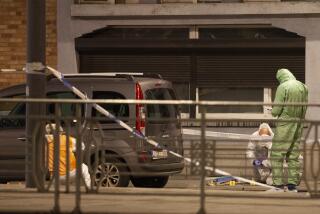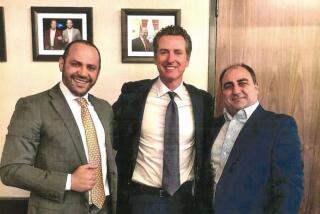One terrorist suspect’s murky trail
MARRAKECH, MOROCCO — The wild ride of Abdelkader Belliraj ended at the Hotel Fashion.
The Moroccan-born Belgian had quite a resume: accused terrorist kingpin, assassin, gangster, double agent -- and hotelier. He visited from Belgium now and then to oversee the hotel, a three-star joint with a sidewalk cafe where men sip tea and watch a parade of whining scooters, dusty taxis, sunburned tourists and veiled Berber women.
Moroccan police allege that the salmon-colored Hotel Fashion, on a downtown corner near a Haagen-Dazs shop and the train station, was a den of outlaws. In February, they arrested the burly, moon-faced Belliraj and three dozen suspected members of a network he is accused of arming for a terrorist campaign.
The 50-year-old’s intrigues over the last quarter of a century chart a singular history of Muslim radicalism, from a meeting with Ayatollah Ruhollah Khomeini in 1981 to a meal with Osama bin Laden just 10 days before the Sept. 11 attacks.
Belliraj allegedly displayed a variety of talents, including ideologue for Moroccan radicals, triggerman for Palestinian mercenary Abu Nidal and bagman for Al Qaeda.
Investigators say Belliraj personifies the dangerous convergence of for-profit thuggery and true-believer terrorism. Authorities suspect him in at least six assassinations, multimillion-dollar holdups, money laundering and arms trafficking in Europe and Morocco.
‘Gangsterrorism’
The Belliraj affair offers a rare, uncomfortably up-close look at the kind of shadowy, dangerous middleman on whom the world’s criminal, extremist and espionage networks often depend.
“This case encompasses just about every genre of terrorism and criminality,” said Khalid Zerouali, a top Moroccan security official. “It’s an example of ‘gangsterrorism,’ the hybridization of terror and crime. From a strategic point of view, you realize it’s about opportunism. Belliraj’s contact with an umbrella of groups, from Al Qaeda to Shiite Muslims, shows that this is business. The important thing is profit, whether financial or ideological.”
The case also gives a glimpse of an underworld of informants whose handlers face a central dilemma: The better the snitch, the more likely it is that he is involved in skulduggery.
“It is a gigantic web,” said a Belgian law enforcement official, who like most others interviewed asked to remain anonymous because of the sensitivity of the case.
While Belliraj made money by breaking laws, he spied for the Belgian intelligence service, according to investigators and Belliraj himself. Although he insists that he acted out of patriotism and didn’t take “a euro,” three Belgian officials say Belliraj was a top paid informant. A Belgian Senate intelligence committee is investigating his case.
The inquiry and his trial might answer big questions: What did Belgian and Moroccan intelligence know and when? Did Belliraj spy for other countries? Is he a brave secret agent or a ruthless terrorist -- or both?
Belliraj was born in Nador, a northern Morocco city with a history of smuggling.
“He grew up with guns,” said Abderrahman Lahlali, a Belgian lawyer for the Belliraj family. “His father was in an Islamic movement and spent time in Egypt, involved in armed activity as well.”
Like many radicals of his generation, Belliraj studied engineering and embraced leftist and Islamic ideas. He migrated to Brussels, married, worked odd jobs and opened a clothing shop. His activism intensified after the Iranian Revolution shook the Muslim world in 1979. Although the fundamentalist regime was Shiite, it attracted many Sunni radicals such as Belliraj.
The Iranian ambassador in Brussels helped Belliraj travel to Iran to meet Khomeini and other ayatollahs in 1981, according to Belliraj’s testimony and his Moroccan lawyer, Mohamed Ziane, a former minister of human rights.
Two years later, Belliraj went to Lebanon, a base of Shiite militant groups, and learned how to use explosives and the AK-47 assault rifle, according to his testimony. He honed his marksmanship at a gun club back in Brussels.
‘Moralist serial killer’
The six unsolved Belgian homicides to which Belliraj has confessed were the work of “a kind of gun-for-hire and moralist serial killer,” a veteran European intelligence official said.
The first two victims were gunned down in the summer of 1988 in gritty immigrant neighborhoods near the Midi train station in Brussels. A well-liked grocer died because the killer thought mistakenly that he was Jewish, investigators say. A 53-year-old gay man was slain in a dispute, possibly after making an advance, they say.
The next four killings seemed political. An assailant using a 7.65-millimeter pistol killed Abdullah Ahdal, the Saudi imam of the Grand Mosque of Brussels, and his librarian in March 1989. The same pistol was used to shoot a chauffeur working for the Saudi Embassy in June. In October, an assassin with a 7.65 ambushed Joseph Wybran, an acclaimed physician and president of a federation of Jewish groups, in the parking lot of the Erasmus Hospital.
Police suspected that the 1989 killings were part of an international onslaught by Iranian-backed terrorist groups against Israel and Saudi Arabia, a Sunni Arab rival of Shiite Iran. The Saudi imam had criticized Khomeini’s fatwa ordering the death of British writer Salman Rushdie. A group tied to Abu Nidal, a Palestinian terrorist-for-hire, claimed responsibility for the Wybran killing, saying it was in retaliation for the abduction of a Hezbollah leader by Israeli forces in Lebanon.
“My husband was a moderate,” said Wybran’s widow, Elly. “And the imam was also a man of dialogue. There had been news about a threat to Jewish leaders in Europe. . . . I told my husband, ‘You should have bodyguards when you attend public events, marches.’ And he said, ‘No, I am not important enough.’ ”
Belliraj was among those questioned in the imam’s slaying because he attended the mosque and was active in pro-Iranian circles. But no one was prosecuted.
Although Belgian investigators were at first doubtful about his confession in Morocco, they say convincing details in the account suggest Belliraj was involved.
But his lawyers question the methods of the interrogators. “He was interrogated for 12 days,” Lahali said. “I can’t answer the question of whether he was tortured. But Mr. Belliraj himself said, ‘If you are in Morocco and you are interrogated for 12 days, you can end up saying anything.’ In front of the judge, he denied any role in the murders that he had confessed to the police.”
Starting the 1990s at a headlong pace, Belliraj married again, to an Algerian with whom he has three children. They moved to a Flemish village outside Brussels, where a search of his two-story house this year turned up a library of 3,000 books, mostly about politics and Islam.
Demonstrating ideological flexibility, Belliraj shifted his activism to Sunni radical networks that were spreading from Algeria to Afghanistan. He traveled across North Africa, the Middle East, Chechnya and South Asia. His specialties opened doors: guns and cash.
“He was a money man for the networks,” said Ziane, his Moroccan lawyer. “That was the key to his access. He collected money from millionaires in Saudi Arabia and brought it to Al Qaeda.”
In the early or mid-1990s, he became an informant for Belgium’s spy agency, officials say.
Ziane said the affable, well-spoken Belliraj seems to have been driven by a talent for cultivating contacts and cutting deals.
“I don’t see him as a man of great religious convictions,” he said. “He regards himself as useful. He knows a lot about international finance and business. He believes that the security services of the world are all-powerful. He thinks everything, including his current troubles, is a problem of negotiation. He does not realize that the intelligence services are treacherous.”
Al Qaeda contacts
As Bin Laden’s Afghan training camps become an intelligence priority, Belliraj made contacts in Al Qaeda at the top level. Less than two weeks before Sept. 11, he had dinner with Bin Laden, Ayman Zawahiri and a Moroccan bodyguard, according to lawyers and investigators. Moroccan investigators say only that Al Qaeda bosses entrusted Belliraj with “a mission.”
In the aftermath of the Sept. 11 attacks, Belliraj presumably impressed Belgian spymasters with an account of his Al Qaeda sit-down. Anti-terrorism officials say he took advantage of his value as an agent to manipulate his handlers as his group in Europe and Morocco stockpiled arms and carried out armored car robberies, shootings and a prison break.
“Either they didn’t know what he was doing, which is bad, or they did know,” a Belgian anti-terrorism official said. “And that’s even worse.”
But Belgian anti-terrorism officials also say Belliraj took his espionage job seriously and helped save lives. He sounded the alarm about an Al Qaeda cell in Britain three or four years ago, enabling British security forces to disrupt a plot, officials said.
The Belgian Senate committee has found that Belliraj also worked for a foreign spy agency, but has not disclosed specifics. He could have been a double or triple agent for the French, British or American services. “It is a business,” an investigator said. “Maybe he played one service against another and got caught.”
There still could be surprises -- such as a video that has surfaced on Moroccan television. A news crew did a report last year in Brussels about immigrants celebrating Ramadan. In a cafe near the Midi train station, the crew interviewed a regular customer: a beefy man with circles under his eyes and a cap on his bald head.
Belliraj said he was happy in Belgium, but hoped to celebrate the next Ramadan in Morocco. He looked relaxed. He smiled.
As though he had nothing to hide.
--
More to Read
Sign up for Essential California
The most important California stories and recommendations in your inbox every morning.
You may occasionally receive promotional content from the Los Angeles Times.










